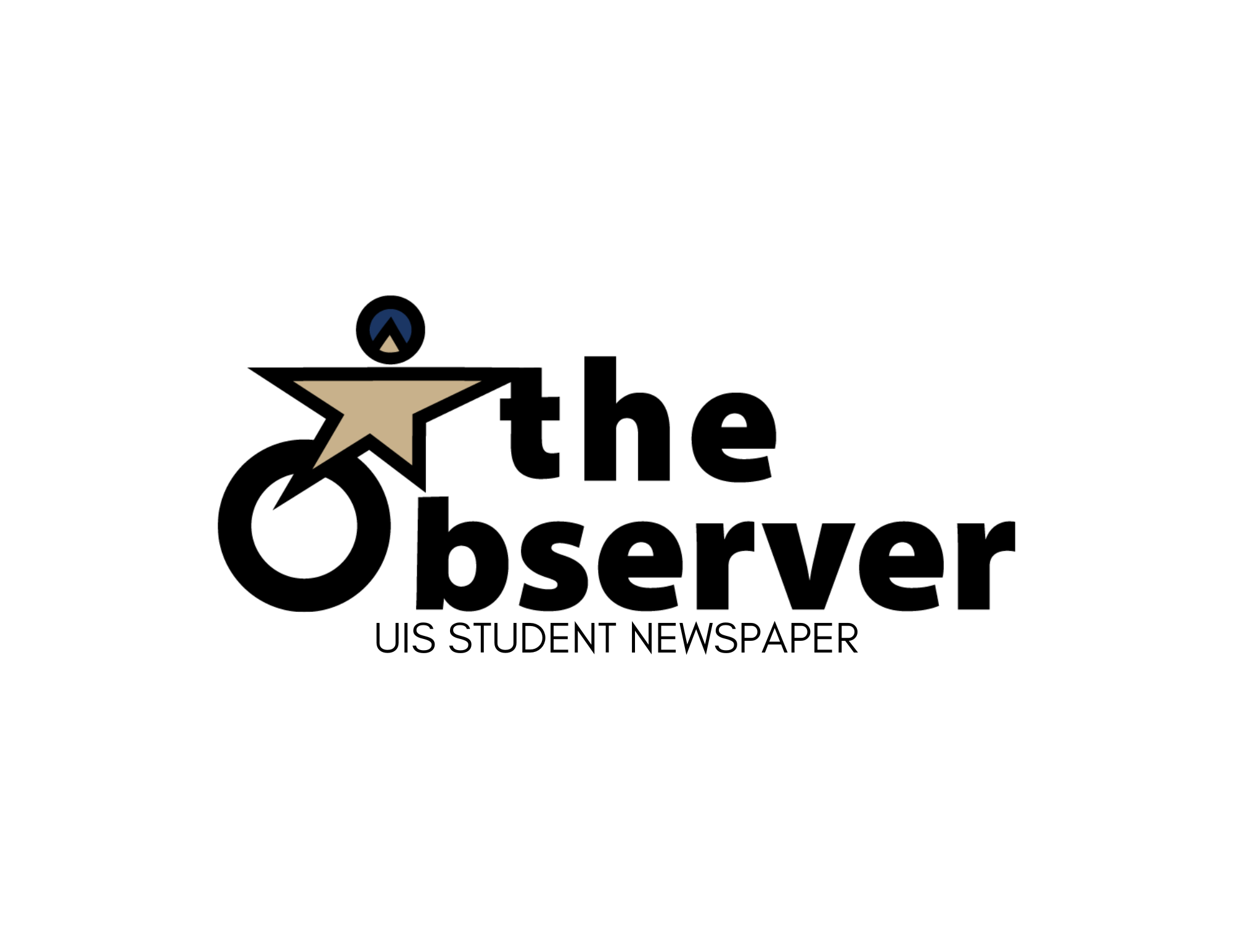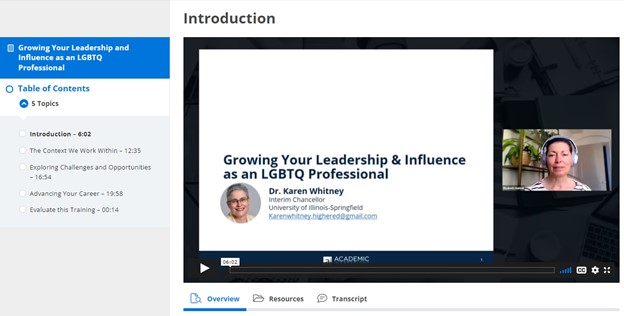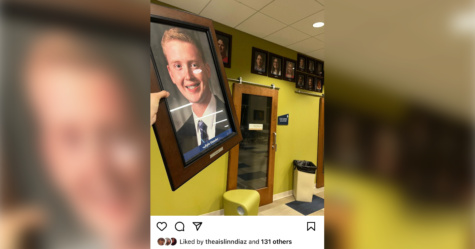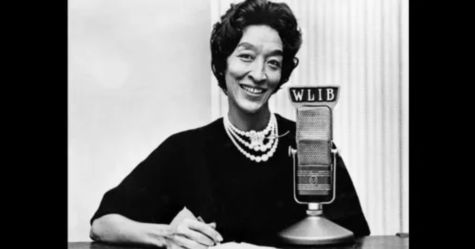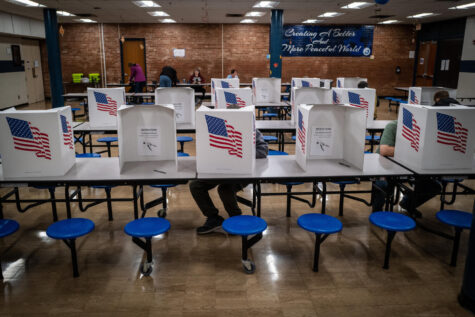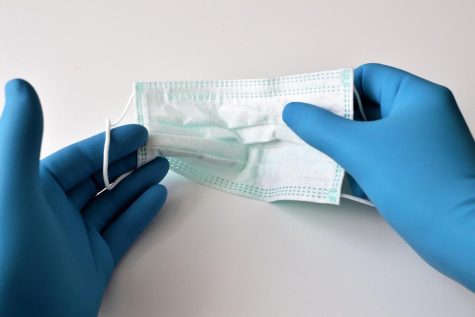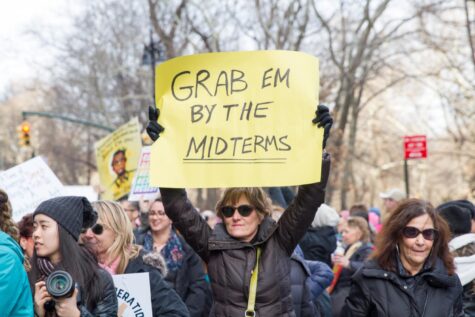UIS has paid more than $50,000 to company that Chancellor Whitney works with
Last November, University of Illinois Springfield entered into a relationship with a firm called Academic Impressions. The company specializes in professional development for higher education and offers courses, trainings, webinars and other services to faculty, students and university staff members. So far, UIS has spent at least $58,700 on their services.
Offerings from Academic Impressions include items like “Writing Your Journal Article: A Bootcamp for Faculty” and “Reopening Campus: Building Student Community Amid COVID Restrictions.”
In March of this year, the firm released “Growing Your Leadership and Influence as an LGBTQ Professional,” a recorded webcast presented by UIS Interim Chancellor Karen Whitney. Whitney is “associated” with the firm, according to her curriculum vitae (CV). While not an employee, the company does pay her to put together webinars, offer coaching and write articles.
The relationship between Whitney, Academic Impressions and UIS is somewhat complicated. When a faculty member brought it to the Journal’s attention, we thought it was worth looking into.
Whitney has worked with Academic Impressions since shortly after she stepped down from being president of Clarion University in 2017.
“I am paid a fee for the exact item I’m working on,” said Whitney, adding that she is not an investor, does not have a role in management at Academic Impressions, does not have a financial interest in the firm and does not have an equity relationship with them.
“Those were specific items I vetted with the UI system, that I vetted with and made clear with the cabinet,” she said.
Whitney’s employment status with Academic Impressions is similar to her employment status at UIS. Whitney does not actually work for the University. Formally, she is an independent consultant associated with a firm called the Registry for College and University Presidents, which specializes in finding interim leaders for universities.
“There is a whole world of work where you’re not an employee — you’re kind of in this other space. The closest thing I’d call it is the gig economy,” she said. “This is a gig.”
For her work with the University, Whitney receives a “monthly fee” of $24,969.67 and a housing stipend of $2,083.33, according to records received from the University of Illinois system. Comparing this to public records of university employee salaries, this makes her the highest paid person at the university.
Because Whitney is not an employee of UIS, she does not have to file the ethics forms disclosing financial interests that are required for state employees.
Whitney’s office decided to purchase Academic Impressions’ services as a result of discussions in the summer and fall of 2020.
It was part of the then-new interim chancellor’s goal of improving the university’s budget, which has had deficits for five of the last seven years. The current year is also expected to run a deficit, according to a budgeting plan published by Whitney’s office.
With the pandemic putting most travel and conferences on hold, a group within the chancellor’s office formed to find a way to effectively use a variety of unspent funds, mostly made up of money that would have gone to travel expenses. They aimed to use the funds on professional development.
“Prior to this effort, we really didn’t have a centralized professional development for all employees,” said Melissa Mlynski, head of human resources for UIS. Mlynski was involved in the decision to purchase Academic Impressions’ services.
After considering several options, the group settled on Academic Impressions as a way to encourage professional development despite the pandemic because of their catalogue of webinars and virtual training sessions.
“I think it’s important to look at it in context,” said Mlynski, referring to the pandemic.
Who initially brought up the idea of working with Academic Impressions is unclear based on conflicting accounts.
“The chancellor brought it to our attention,” said Mlynski, who added that Whitney was clear that she was associated with the organization.
Whitney, however, recalls it differently.
“I didn’t bring it up, but others on the cabinet mentioned how they’d used them,” she said.
Either way, both Whitney and Mlynski recall the chancellor recusing herself from voting on or formally participating in the decision to hire Academic Impressions, though she did contribute to the discussion about them.
In November 2020, the University paid Academic Impressions $48,600 for membership dues and professional services. Another payment of $10,000 for “Association Membership Dues” was made in June of this year, according to financial records obtained from the University of Illinois System. Prior to this, the University gave the firm several dozen smaller payments over several years for individuals to attend virtual conferences and trainings.
Between starting this relationship and July 1, 2021, 150 people at the University took part in 564 total trainings, with 95 of the individuals taking part in more than one training.
For context, there are 742 faculty and staff members at the university, with 201 full time faculty, according to the University website. At most, about one in five employees of the university have used the service.
In February of 2021, the Chancellor’s office presented this arrangement with Academic Impressions to faculty at a meeting of the Campus Senate, the University’s governing body made up of mostly faculty members.
At the time, people wanted to know more about how this decision was made and about Whitney’s relationship to Academic Impressions. That means that the $48,600 the university spent on Academic Impressions in its first year is equivalent to roughly one third of the base rate of faculty development.
“I did get questions along these lines,” said Lynn Fisher, a professor of anthropology. Fisher was chair of the Campus Senate at the time of the meeting. “People did have questions.”
Fisher still wonders if the university’s relationship to Academic Impressions is ongoing and what the relationship entails, exactly.
“I’d like to see us move toward some transparency in budgeting, investments and how it works out for us,” she said.
For faculty, Academic Impressions’ offerings are more theoretical compared to the practical workshops offered by the Faculty Development Resource Office on campus, which is led by faculty. These include workshops on using Canvas, teaching strategies and navigating online learning at UIS.
Faculty also receive $800 per academic year for professional development for things like conferences, journal subscriptions and professional association memberships.
Whitney has not, to The Journal’s knowledge, committed any violations of policy or procedure. In fact, she apparently went out of her way to make her relationship to Academic Impressions known and removed herself from formally participating in the final decision of hiring Academic Impressions in an active attempt to handle this situation ethically.
But the fact remains that the University and its upper management approved paying Academic Impressions tens of thousands of dollars while Whitney continues to do work for and receive compensation from them.
The Journal’s Editorial Perspective
Note: Andrew Adams reported this story and was not involved in the editorial section. The editorial section was written by the editors of The UIS Journal and are their opinions solely.
As always, The UIS Journal works to bring news important to the University Community. It is the view of the Editors that despite none of these actions technically being unethical, it exemplifies an ethical grey area that truly worries us as students. It brings many questions about university policy, employment practices and ethical standards.
In spite of the university’s choice to purchase services from Academic Impressions, which Interim Chancellor Whitney does financially benefit from, we found the relationship between Whitney and Academic Impressions more than coincidental. And while, on paper, all the I’s were dotted and T’s were crossed, is this truly acceptable? Is it acceptable that the current top administrator, making the highest salary on campus (the aforementioned $24,969.67 plus monthly housing stipend of $2,083.33) is also making additional money through choices to employ consulting services using university funds? Funds which she, simultaneously, benefits from while also having control over budgetary expenditures at the University.
While we cannot tell you what to think, we can lay out the facts and give you our perspective. Our perspective here is that this is wrong, maybe not by policy, but ethically. For one who seemingly has a conflict of interest to be involved in the conversations surrounding purchasing additional services, from which they also benefit financially, is inappropriate. And for that same person to also have discretionary power over university budgetary funds, makes this truly remarkable, in our opinion.
For the $58,700 that has been paid to Academic Impressions for surface-level professional development, our professors could have had larger budgets for conferences, research, or many other more productive and beneficial activities. If we did some simple math of the 201 full-time faculty members, each faculty member could have had roughly $290 more to use for activities that would help them grow and further our learning experience here at UIS. Instead, that money was considered better spent, seemingly, on an outside contractor that appears to have a conflict of interest with our own University Chancellor.
We feel like this opens a much larger conversation about how to prevent such incidents from happening again in the future. We believe there needs to be a solidified change in university policy around conflicts of interest and ethics to prevent unethical occurrences on our campus. We ask you, the students, and general University community, to make your own decisions on whether you deem this behavior as appropriate, despite the current policy.
As innate financial supporters of the university – or as we were identified in a previous article, “productivity units” – we are greatly concerned about the use of our tuition and fees to support such egregious University actions. Yet again, as seen in our reporting regarding the UIS Faculty Union negotiations, we find Chancellor Whitney at the epicenter of another university issue, an apparent pattern of sorts. Such occurrences not only stunt Whitney’s image but, at worst, exude impropriety in the top Administration of UIS. We will leave you to make the decision about which it is.


